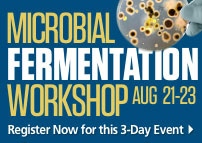30 June 2015
Explore Cutting-edge Practices at Upcoming Microbial Fermentation Workshop
To think big, you need to start small – really small. That’s the theory behind the booming business of microbial fermentation.
 While the term “microbial fermentation” is hardly a household term, it is a process that continues to revolutionize a wide range of industries from food to fuel to fabric and beyond.
While the term “microbial fermentation” is hardly a household term, it is a process that continues to revolutionize a wide range of industries from food to fuel to fabric and beyond.
To bolster this growing and important field, University of California, San Diego Center for Continuing Education in Biosciences (CCE/Bio) and UC San Diego Extension have jointly developed a three-day workshop to help professionals in the field keep up with the latest developments and expand their current knowledge of experimental design processes. The workshop – now in its third year – runs from Aug. 12 to 14 at UC San Diego.
“Microbial fermentation is really big, and it’s growing really fast,” said Jeff Lievense, executive vice president of process technology at Genomatica, a local biotech firm, and one of the workshop’s instructors. “It will change our world over the next 50 years.”
In its essence, microbial fermentation is the transformation of organic substances such as bacteria, yeast, fungi and algae into other products. Think antibiotics, beer and biofuels. Now because of ongoing advances in the field, which are reducing development times and costs, there is an array of new and mind-bending innovations on the horizon.
Participants in the workshop will have a front-row seat to those advances and the underlying fundamental tools through interactive training, case studies and one-on-one consulting.
This year’s program features some of the brightest minds in the field including, James Golden, Ph.D., professor of molecular biology at UC San Diego along with distinguished faculty from MiraCosta College and industry leaders from such firms as Genomatica and DuPont. The instructional team, which brings more than 100 years of collective industrial experience, will offer a deep dive into microbial growth and metabolism, bioreactor operations and the scale up of those operations, design and analysis of experiments, and bioprocesse design and economics.
Lievense said the three-day workshop is able to attract attendees from around the world because microbial fermentation is considered a huge growth industry. While microbial fermentation is used in a variety of industries including pharmaceuticals and agriculture, the global quest for sustainability is driving the rapid growth of industrial biotech, which focuses on fuels, plastics, and chemicals. Millions of products – from clothes to toys to paint solvents – that are now made from petroleum-based synthetics can instead be created from natural and environmentally friendly materials using microbial fermentation.
Industry analysts estimate that these more sustainable products currently represent about 10 percent of all global plastic and chemical revenue, or about $150 billion. By 2030, that number could increase to as much as 30 percent. Recently toymaker LEGO, which known for its iconic plastic building blocks, just announced it will invest $150 million in research over the next 15 years to develop sustainable replacements for its fossil-based plastics by 2030.
Lievense called LEGO, a “great example” of both the economic and environmental promise of microbial fermentation and commended the company for its foresight.
“All of the chemicals that make up LEGO pieces could be made instead by microbial fermentation of renewable feedstocks,” he said.
While workshop participants should have some basic knowledge and experience in fermentation, Lievense said everyone from scientists and engineers to biotech business executives to graduate students and even local craft brewers could benefit from this unique program. As one of just a handful of programs that provide in-depth, practically oriented coursework in microbial fermentation, it draws participants from around the world.
Those interested in finding out more about the three-day workshop can visit extension.ucsd.edu, call (858) 534-9353 or email unexbio@ucsd.edu.